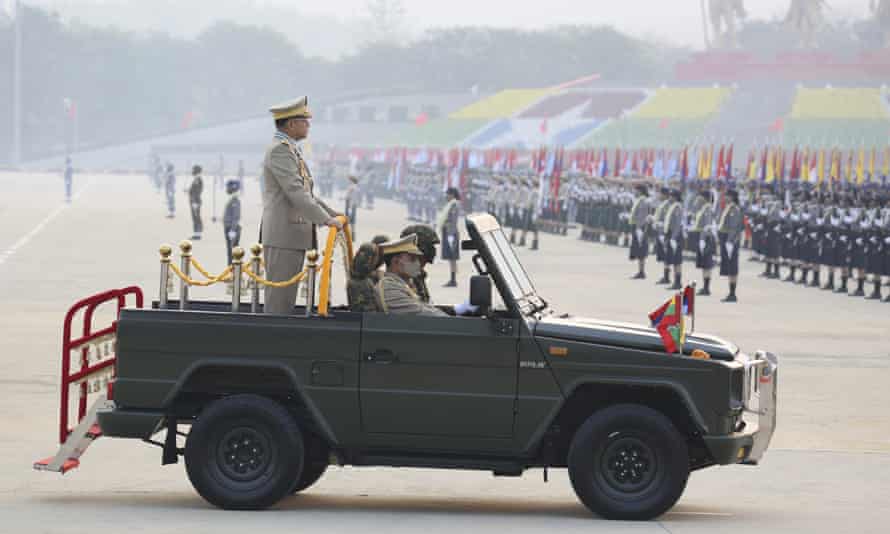Extract from The Guardian
Hundreds have died since February’s coup. Civilians are defiant – but while their resistance persists, so does the military’s bloody grip on power.

Min Aung Hlaing, the head of the military junta, at an army parade in Naypyitaw, Myanmar, on 27 March.
Last modified on Wed 31 Mar 2021 15.53 AEDT
Eleven-year-old Aye Myat Thu was buried with her dolls at the weekend, hours after she was killed by security forces in Myanmar. The horror of her death is far from unique: more than 30 children have reportedly died in the brutal crackdown on protests against last month’s coup, including a five-year-old boy and a seven-year-old girl who was shot dead in her home.
More than 100 people were killed on Saturday alone. More than 500 have died since the military seized control, arresting the civilian leader, Aung San Suu Kyi, and other elected politicians from her National League for Democracy (NLD), and wresting back what power they had allowed the people. The deaths and arrests are only part of the damage. The economy of one of Asia’s poorest countries is now in desperate straits, with the coup’s fallout compounding the pandemic’s impact.
The ruthlessness of the Tatmadaw is no surprise. What is more startling – perhaps to the military most of all – has been the defiance of the civil disobedience movement. The younger generation did not grow up under military rule, in constant fear. They have drawn inspiration from activists in Hong Kong and Thailand. While previous pro-democracy movements were rapidly extinguished with the gun, thousands took to the streets again on Monday.
The Tatmadaw’s response has been to intensify its violence, fuelling the anger. While the protests have overwhelmingly been peaceful, some activists are turning to armed struggle. Myanmar’s ethnic minorities have long suffered at the hands of the military – the weekend saw punishing airstrikes near the Thai border after Karen fighters captured an army outpost – and several armed groups have said that they are on the side of the democracy movement. But while there is talk of unprecedented unity and even a “federal army”, ethnic minorities have been promised solidarity before, only to be abandoned later. And the military is large, well funded, well armed and utterly relentless.
The generals designed the constitution so that they retained control over the military budget and other key areas, with the NLD kept on a tight leash; the party’s second electoral landslide was not going to change that. Many suspect that Min Aung Hlaing’s wish to remain in charge after his time was up as chief of the armed forces led to a miscalculation. But the military would not have grabbed back power were it unduly concerned about the response. The generals have enjoyed impunity for decades. They continued bombing ethnic groups as sanctions were lifted. When a 2019 UN fact-finding mission urged the international community to cut ties with the military and the companies it controls, warning that its revenues were increasing its ability to carry out horrifying abuses against groups including the Rohingya, no one listened. A speedier reaction to the coup itself might perhaps have done something to curb the armed forces’ bloodier impulses. But late is better than never.
The US has now suspended all trade until the return of a democratically elected government. The UK has partially cut off its dealings with military businesses, but the EU has held off: it must act. Businesses, especially the oil and gas giants, should make sure that their money does not flow to the military. Countries should also press Myanmar’s neighbours not to repatriate those who have fled. There will be no knockout blows against the Tatmadaw. But there can be no indifference to its crimes.
No comments:
Post a Comment